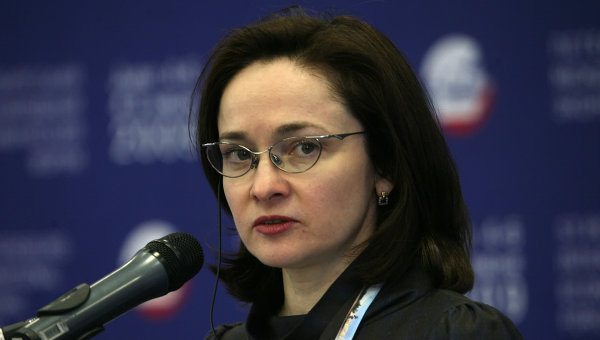As the Ruble began crashing last October due to falling oil prices, Russia had to defend its currency from complete collapse. A unit of currency, if unbacked by any commodity, is a claim on the economic output of a State. Russia being the largest exporter of oil in the world, it is understandable that a collapse in the price of oil would lead to the collapse of the currency of the largest oil exporter. From the chart below, it is clear that oil and the ruble/dollar exchange rate generally move inversely.
In order to defend the currency, Russia’s central bank head Elvira Nabiullina raised interest rates to the current level of 17%. In addition to that, Russia began selling its foreign exchange reserves for Rubles, retiring the Rubles in an attempt to prop up the exchange rate still further. Russian foreign reserves are now down to $385B, the smallest amount since 2008, but still substantially higher than they were at the turn of the century.
The only thing that Russia did not do is sell its gold reserves to defend the Ruble. In fact, the Bank of Russia actually added 600,000 ounces to its holdings, upping its total reserves to 13% of foreign exchange reserves. The fact that the Bank of Russia added to its gold hoard in December in itself is not unique. But the fact that it added to its gold hoard at the expense of defending the Ruble while it was in total free fall, certainly is.
In order to increase its gold reserves, Russia had to sell some of its foreign currency in order to obtain it – forex it could have used to further defend the Ruble, but chose not to. What this says is that increasing its gold reserves was for some reason more important to Russia, under the administration of Nabiullina at least, than defending the Ruble itself.
The real question is why. If Nabiullina is loathe to sell the Bank of Russia’s gold reserves even in a full-fledged currency crisis, when would she think it is a good idea to do so?
Nobody knows for sure, but the real answer might be never. In that case, what Russia is doing, for all intents and purposes, is to back the Ruble with gold. While buying gold does not provide any short term boost to the Ruble on international exchange, it would provide stability in the long term to the Russian currency, especially if made directly convertible at a fixed rate.
